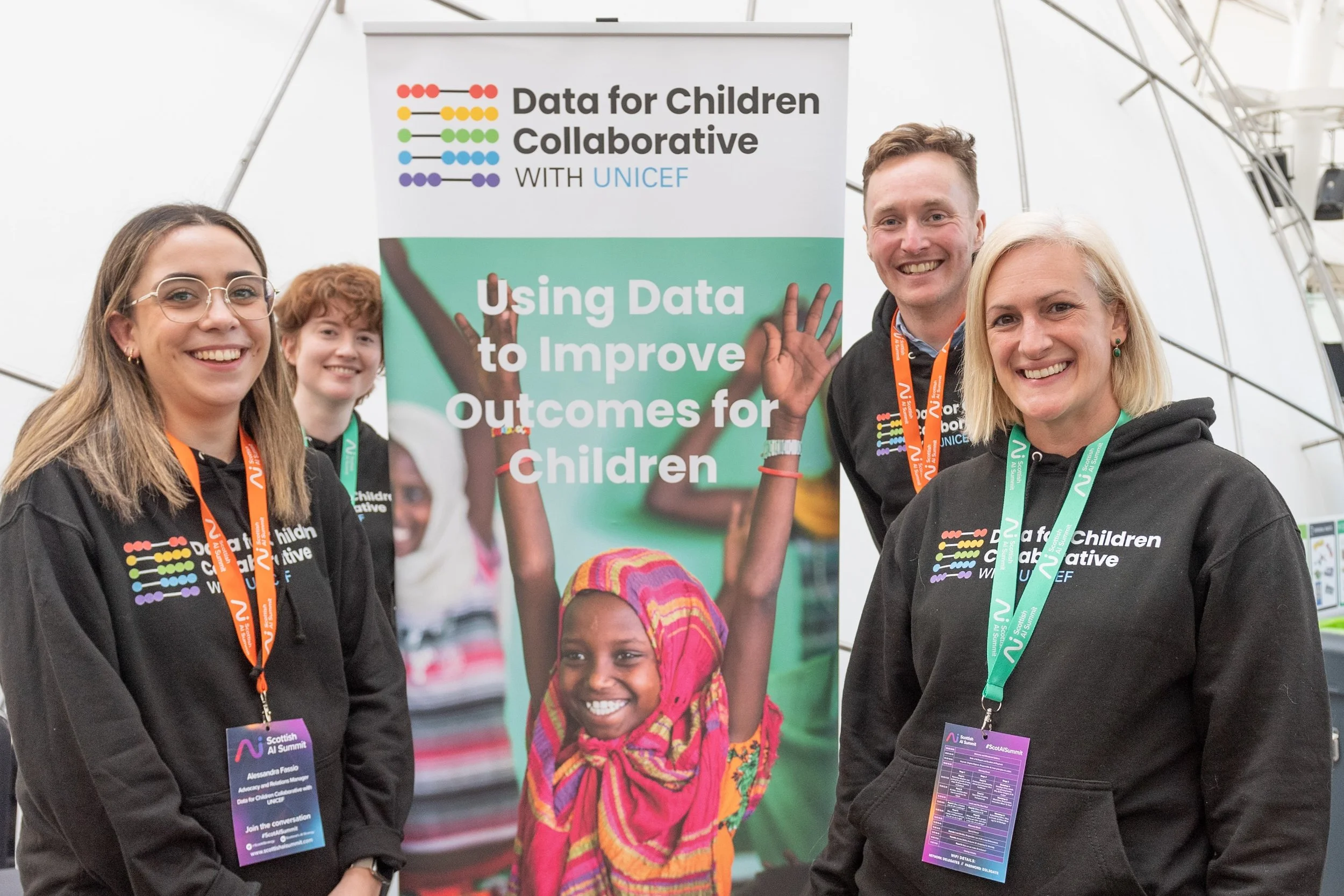Data for Children Collaborative with UNICEF at the Scottish AI Summit
Guest blog from Fraser Macdonald, Head of Delivery and Innovation at the Data for Children Collaborative with UNICEF.
On the 30th of March, the AI Strategy team hosted their inaugural Scottish AI Summit. A combination of keynotes, workshops, panels, and exhibitors, arranged in a hybrid format, enabling attendees to participate worldwide.
But why were we all there? What was the purpose of this event? And what did we achieve?
Attending in person was both a privilege and a strangely nostalgic experience. Sharing coffee and stories with colleagues, being part of an attentive audience, exploring ideas through in-person workshops, and meeting a diverse range of new organisations and the people behind them. The Scottish AI Summit provided an excellent start to the conference season.
Our purpose for being there
The Data For Children Collaborative with UNICEF (DCC), a partnership between Edinburgh University, Scottish Government, and UNICEF, attended the conference in person, branded up with new hoodies and ready to talk about all things responsible data and improving outcomes for children. We wanted to meet new organisations, learn from others, and run our side event about all things Responsible Innovation.
The DCC is highlighted within Scotland’s AI Strategy as an example of how children are at the centre of Scotland's AI principles. Our core goals align as we seek to improve outcomes for children through the safe use of data and AI. Our role at DCC is to address the challenges head-on while adopting responsible practices to ensure our solutions are designed with trust, transparency, and safe data.
One of the mechanisms we use is our Responsible Innovation Framework. In practice, this framework consists of a series of tools and processes that our collaborative teams use throughout a project lifecycle. Each stage has been designed to be a tangible and practical addition to a project that ensures projects align with our values. The tools are based on learned experience, building on advice, expectations, and mistakes. To us, they are meaningful and purposeful – but do they mean anything to anyone else? That's the question we wanted to explore during our workshop.
Our Workshop
The term 'Responsible Innovation' is becoming commonplace within the tech industries – 'Responsible AI' more so in the data science community. With more and more organisations using this phrase, will it begin to lose all meaning? Do we risk using it like a 'get out of jail free card'? Never really thinking about our responsibilities when the excitement of a novel idea or innovation takes traction.
The purpose of our workshop was to start a difficult conversation: "What does Responsible Innovation Mean to You?” We identified experts in the field who interact with or use this term daily. We asked them what it means while asking the audience (in-person & online) to provide their perspectives. Understandably, there was no general consensus – how could there be? Responsibility means so many things to so many people. However, what was clear is that there are terms that are more popular than others. Notably, there are apparent correlations with Scotland's strategic vision of being "Trustworthy, Ethical and Inclusive" when developing AI. However, there are other common themes – the importance of participation and transparency.
But how do we as a community take practical steps to ensure these terms are put into practice? What tools do we have to ensure Responsible Innovation is meaningful and tangible? At DCC, we have attempted this through our Responsible Innovation Framework – but have we got this right? Does everyone agree with what we have done?
Asking our audience to rank the most common responses by importance, we challenged our industry experts to give real examples of their practical actions to ensure these terms are fulfilled. From an AI Strategy Playbook perspective, we began to explore how to put Responsible Innovation principles into practice. The conversation was insightful, heated, and highly valuable.
What Happens Now?
When we first began developing the idea for our workshop, one thing was certain – this would be the start of something, not the end. One of Scotland's core strengths on the global stage is its close community. We have active sectors, supportive infrastructure, and high-quality events like the Scottish AI Summit. This has led to a dynamic and engaged community who are not afraid to roll up their sleeves, get stuck in, and collaborate.
We wanted to use this event as a Launchpad for something bigger – creating a community that can work together to reach a common understanding of what Responsible Innovation means to Scotland. There is work to be done and an appetite to do it. Our responsible innovation Framework works for us – but this can continually be improved. DCC learns by doing and accepts it might not get it right the first (or second!) time. It's a healthy way to work. We are now exploring options to create a space to share perspectives, challenge ideas, and develop a shared understanding of what "Responsible Innovation" really means.
Instead of a 'get out of jail free card', perhaps Responsible Innovation can become something far more valuable – a tangible and agreed set of practices that continue to put Scotland on the map.


